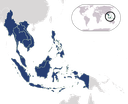Winter Term 2015/2016
Social and Cultural Anthropology/ Political Science
International Migration, Worldviews and Identities in Indonesia
Mirjam Lücking, Jürgen Rüland
Time/ Place: weekly every Tuesday, 12 PM to 2 PM at Breisacher Tor, Room R 206
Language: English
Summary: Migration, both historically and contemporarily, has a significant impact on culture and social structures in Indonesia. In the age of globalization, the global cultural flows of people, commodities and ideas are increasingly significant (Appadurai 1990) and often related to practices of imagining a cultural “other” that serves as a reference point for self-identification. Here we find alignments and solidarity as well as imagined cultural boundaries (Gupta & Ferguson 1992). Especially since the end of the Suharto regime in 1998 and the following period of democratization, there have been new orientations towards global reference points in Indonesia. Research in political science, on the other hand, links migration to security issues, economic and political remittances of migrants to their home society and the emergence of transnational social and political spaces. By linking anthropological and political science theories about mobility, worldviews and identity constructions to case studies on labor migration, diaspora communities, tourism and international education we discuss how Indonesians view the world and position themselves in it.
The seminar is part of the preparation for the interdisciplinary student research project funded by the DAAD and jointly conducted the Anthropology and International Realtions Departments of the University of Freiburg, Gadjah Mada University, Yogyakarta and Universitas Hassanuddin, Makassar. The field research exercise is scheduled for summer 2016 in Makassar, Indonesia. All students interested in participating in the project must attend this preparatory seminar.
Economics
Governments Breaking Bad - Corruption and Clientelism
Günther Schulze
Time/ Place: Thursday 03 December 2015, 2 PM to 6 PM / Monday 19 December 2015, 2 PM to 4 PM / 08 January - 10 January 2015, 9 AM to 6 PM
Language: English
Additional "Übung" offered by Gerrit Gonschorek.
Political Science
Democracy and Development - A Comparative Asian Perspective
Christian von Lübke
Time/ Place: weekly every Wednesday, 4 PM to 6 PM
Language: English
Summary: Asia lends itself well to a comparative analysis of political change. Regional political dynamics - ranging from Indonesia's consolidating democracy, over Malaysia and Singapore's electoral authoritarianism, to Thailand's democratic rollback - provide important insights into the relationship between democracy and development. By drawing on the experience of selected Asian countries (Japan, China, Indonesia, Thailand, and the Philippines), this course will trace historical and institutional underpinnings, explore the characteristics of political agency, and examine regional policies and development outcomes.
During the seminar, students will investigate a range of thematic questions that help to understand the workings of democratic governance and state-society relations - in Asia as well as other developing democracies. The course combines theoretical and empirical perspectives of democratic change and development. The aim is to introduce students to the diversity of the region and, at the same time, encourage a critical awareness of the forces that drive (or constrain) broad policy reforms and socio-economic development. By the end of the seminar, students will have gained a deeper understanding of contemporary Asian politics and current governance/democracy debates.
Internationale Politik - Menschenrechte in Südostasien
Jürgen Rüland, Stefan Rother
Time/ Place: weekly every Wednesday, 4 PM to 6 PM at Breisacher Tor, Room R 107
Language: German
Summary: Sind Menschenrechte universell, oder nur ein westliches Konzept? Auch wenn die „asiatische Werte“-Debatte in den letzten Jahren etwas an Schärfe verloren hat, ist das Thema Menschenrechte sowohl in einzelnen Staaten Südostasiens als auch für die Region von ungebrochener Relevanz. Dazu zählen Flüchtlingsboote auf hoher See der Rohingya aus Burma/Myanmar, denen in ihrer Heimat Staatsbürgerschaft und selbst der Name verwehrt werden, Unterdrückung von Meinungsfreiheit, die Ausübung der Todesstrafe, Zwangsumsiedlungen, die Misshandlung und Ausbeutung von ArbeitsmigrantInnen in Malaysia, Thailand, Singapur, forced disappearances, nicht-staatliche Gewalt u.v.a.m.
Diese Herausforderungen verlangen umfassende Antworten nicht nur auf der nationalen, sondern auch transnationalen und regionalen Ebene. Von staatlicher Seite wurden hierzu auf nationaler und teils auch regionaler Ebene Menschenrechtskommissionen eingerichtet, deren Unabhängigkeit und Effizienz aber oft eingeschränkt sind. Auch die Zivilgesellschaft hat begonnen, sich jenseits der nationalstaatlichen Ebene zu organisieren, muss dabei aber um Raum und Zugang für politisches Engagement kämpfen.
Das Seminar widmet sich diesen Fragestellungen aus Perspektive der international und transnationalen Beziehungen und umfasst theoretische und methodische Zugänge, Akteure und Fallstudien. Fester Bestandteil des Seminars ist eine Fachtagung "Zwischen Macht und Ohnmacht - Menschenrechte, Bürgerrechte und Repräsentation in Asien" in Weingarten bei Ravensburg vom 8. bis 10. November 2015, auf der Länder- und RegionalexpertInnen sowie AktivistInnen einen umfassenden Überblick über die Menschenrechtssituation in der Region geben. Die Tagung an sich ist kostenfrei, für Unterkunft und Verpflegung wird allerdings ein subventionierter Teilnahmenbeitrag fällig. Teile des Seminars werden zudem als Blockseminar in Freiburg abgehalten.
Language Class
Sien Brüstle
Time/ Place: weekly every Monday, 9 AM to 11 AM at Werthmannstr. 10, HS 01 009
Language: German/ Bahasa Indonesia









